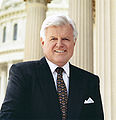The fourth Kennedy
The fourth Kennedy (Original: English The Fourth K ) is a 1990 published novel by Mario Puzo . It is about the presidency of Francis Xavier Kennedy , the imaginary nephew of John F. Kennedy , Robert F. Kennedy and Edward Kennedy .
content
The novel begins shortly before the end of Francis Xavier Kennedy's first term. He has just informed his staff that he will no longer apply for a second term when the members of a terrorist group start a large-scale series of attacks. First they kill the Pope and then they hijack the plane in which Theresa , the president's daughter, is sitting and flee to the imaginary oil-rich state of Sherhaben in the Middle East. She is subsequently shot by the terrorist leader. Thereupon Kennedy gives the ruler of Sherhaben an ultimatum: If he does not hand over the leader of the terrorists, Yabril , and free the hostages, the air force will destroy his capital and, as a result, the entire national territory. This alarms the members of the Socrates Club , a secret lodge, who see their extensive investments in Sherhaben as a result of the bombing . They conduct on their connections in Congress one impeachment one against the President, but that fails what a simultaneously at Times Square exploding atomic bomb related. After that, Kennedy runs for another term and wins the elections. At the victory celebration, however, he is shot by a lone perpetrator.
shape
The fourth Kennedy is written from the perspective of an omniscient narrator . The motives of all important characters are revealed through flashbacks, which mostly have the character of a complete biography from their childhood to the time of the action.
review
John Kenneth Galbraith of the New York Times was impressed by the author's imagination (“I am impressed by the author's imagination”), but doubted the probability of the scenario (“I am somewhat less impressed by the plausibility of his prospect”) . The impeachment proceedings and various other matters, including the atomic bomb explosion, were beyond credibility. ("In that lightning impeachment and, I think, in quite a number of other matters, including the homemade bomb in New York, it goes well beyond the range of reasonable probability.")
Christopher Lehmann-Haupt went hard with the novel in his book review, also for the New York Times . In his opinion, the characters were shaped by the events instead of their human traits (“The characters are constructed from events instead of being built from human traits.”). This resulted in clunky and inharmonious prose (“A result is that the novel's prose is almost always clunkily out of tune.”). In addition, Puzo too often got lost in details irrelevant to the story.
The author himself described the work as a commercial failure, but as his most ambitious book (“The Fourth K was a (commercial) failure but it was my most ambitious book.”).
output
- Mario Puzo: The fourth Kennedy (= Knaur . No. 60094 ). Droemer Knaur, Munich 1993, ISBN 3-426-60094-3 , pp. 576 (English: The Fourth K. New York 1990. Translated by Gisela Stege).
Individual evidence
- ^ John Kenneth Galbraith: A Bad Week for the President. In: The New York Times. January 13, 1991, accessed May 13, 2013 .
- ↑ Christopher Lehmann-Haupt: Books of The Times; Oil and Terrorism in a Puzo Thriller. In: The New York Times. January 10, 1991, accessed May 13, 2013 .
- ^ The Fourth K. In: Mario Puzo's official website. Retrieved May 7, 2013 .


